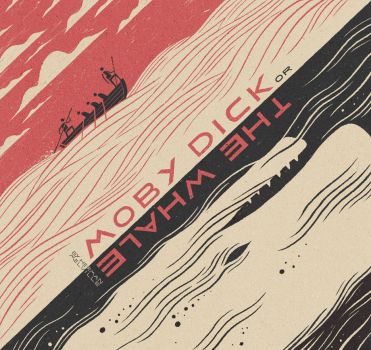
One of the more striking images for Moby-Dick that I’ve come across; it seems to be as much about the novel’s ideas about the interaction between humans and Nature as about its central action. Source
As I worked toward a conclusion in my previous post, it occurred to me that some things yet remain to be said about the implications of using Naturalism’s presuppositions about the world and our place in it as a foundation on which to build the Anthropocene novel. To point the reader toward Jack London’s “To Build a Fire” and say “Here is something like a template for what those presuppositions would look like” is to say, in effect, that such novels would be dark indeed.
Well, many of them, yes. But perhaps not all, or at least all the time. But because Nature, in these novels, will Matter, such novels’ respective zeitgeists will be situated in such a way that human concerns and hopes and fears cannot but be depicted as direct responses to Nature–whether in accord with or defiance of Nature, no matter, but never independent of it, never with Nature as a passive backdrop or submissive setting, but always with it having an unmistakable bearing on the resolution of the narrative, usually “winning” or at least bending people to its will (whatever those might look like given Nature’s fearsome indifference), and yet itself remaining inscrutable. In other words: if we’re looking at American literature for examples of what we might call proto-Anthropocene novels, Cooper’s Leatherstocking Tales, canny as they occasionally are, through Natty Bumppo, about what we would now call sustainability, would not be models for Anthropocene novels; they are ultimately about human choices in dialogue with other human choices, but not in dialogue with Nature–at least, that latter dialogue seems not to rise to the level of narrative. On the other hand, I’d nominate Melville’s Moby-Dick as a fine candidate for an Anthropocene novel (no “proto-” about it, come to think of it): the central activity of the novel, whaling, is an activity which God, speaking out of the whirlwind to Job, taunts Job (and the reader/listener) as something humans are supposed to be incapable of doing (recall that one of the novel’s Extracts is from Job); Ahab sees Nature, as embodied by the whale, as a malevolence he must try to overcome so as to understand his place in the cosmos; in contrast to Ahab, Ishmael’s post-Pequod musings on whale-ness end in the whale’s nature (and Nature itself) remaining inscrutable, as unreadable as those scars on some whales’ outer skin that resembles writing; Nature “wins.” (And as I write this, I begin to realize there is much, much more to say about Moby-Dick within this context than I can here.)
Anyway. Below the fold are some fairly knee-jerk, broad-stroke speculations regarding what Anthropocene novels might look like, along with some uninformed musing, combined with heavy reliance on John Berger and a shout-out to Dan Barber, about what an Anthropocene aesthetics arising from Nature might look like.